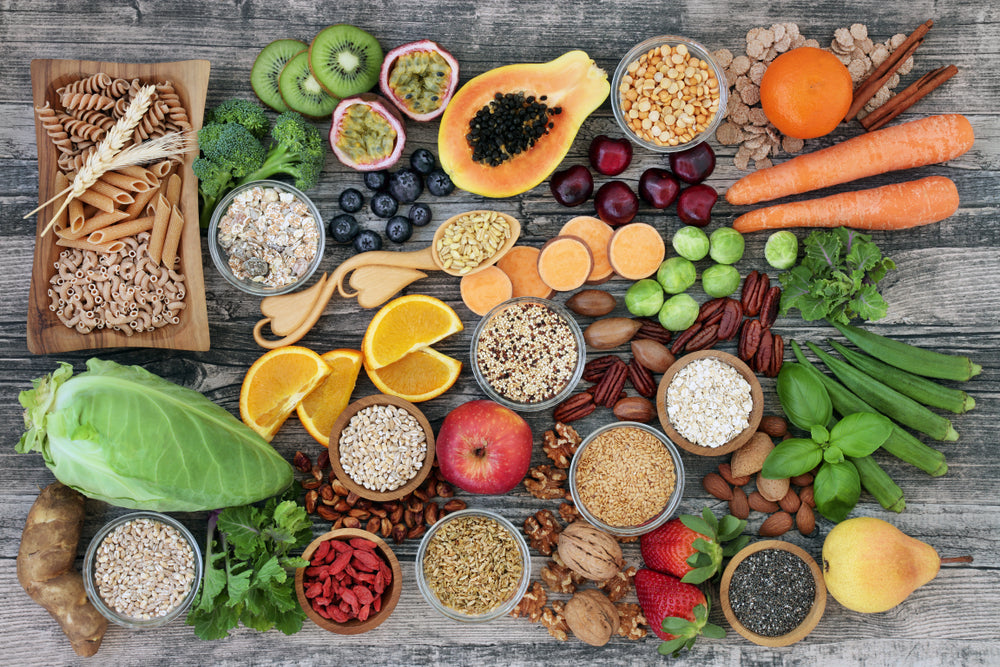Colon cancer is the third most common cancer in the United States, affecting about one in 25 people. Besides getting routine screens, healthcare professionals recommend eating a diet low in animal fats and high in fruits, whole grains, and vegetables to reduce the risk of developing colon cancer. Those beneficial foods are rich in prebiotic fibers, which positively affect the gut by supporting probiotic microorganisms as well as those that generate short-chain fatty acids (SCFAs), which detoxify harmful substances as well as prevent high fat-induced obesity and insulin resistance.
All told, while the research looking at the link between diet and colon cancer is ongoing, it does appear that a diet rich in prebiotic fruits, grains, and vegetables is associated with lower risk for and/or improved management of many diseases, colon cancer included.
[[mailing_list]]
What causes colon cancer?
The colon is composed of three segments of the large intestine: the ascending colon, the transverse colon, and the descending colon, which together are responsible for absorbing water and certain nutrients from food. Colon cancer develops when cells in the colon grow out of control, creating cell masses called polyps that over time can turn into cancer. Colorectal cancer is a type of colon cancer that affects both the colon and rectum.
Although the exact causes of colon cancer aren’t completely clear, there are certain risk factors that contribute to the development of precancerous polyps:
-
Age: The risk of colon cancer increases with age, with the average age of diagnosis being 68 for men and 72 for women. However, the incidence of colon cancer is rising in young adults, possibly due to unhealthy behaviors related to diet, gut microbiota, and inflammation.
-
Family history: Although most colon cancer cases do not have a genetic component, about one in three people who have colon cancer do have a family history of it. If you have a family history of colon cancer, healthcare recommendations can change, including getting screened earlier and more often, undergoing colonoscopies, and performing genetic testing and counseling.
-
Inflammatory bowel disease (IBD): Individuals with IBD (ulcerative colitis or Crohn's disease) are at an increased risk of developing colon cancer. Recently, the incidence of developing colon cancer with IBD has decreased due to improved control of inflammation in the lining of the colon.
-
Obesity: Being obese increases the risk of developing colon cancer by about 1.3 times, possibly due to poor dietary choices affecting gut health.
-
Alcohol use and smoking: Drinking alcohol and smoking both increase the risk of developing colon cancer, likely through damaging the lining of the colon.
- Diet: A diet that is high in red meat and processed meats has been linked to an increased risk of colon cancer. In contrast, eating lots of fruits, vegetables, and whole grains is linked to decreased colon cancer incidence, possibly through beneficial prebiotic effects.
What are the symptoms of colon cancer?
Unfortunately, many people won’t exhibit any symptoms during the early stages of colon cancer, which is why screening is such a valuable tool for early diagnosis. When symptoms begin showing, they will often vary from person to person depending on the sizes and locations of the polyps within the colon. Here’s what to watch out for:
- Persistent irregular bowel movements or blood in the stool
- Long-lasting abdominal discomfort such as gas, cramping, or pain
- Unexpected weight loss
- Fatigue
If you have any of the symptoms above and are in your 60s or older, it might be a good idea to talk with your healthcare provider about getting a colon cancer screen.
How might prebiotics aid in reducing colon cancer risk?
Prebiotics are a type of non-digestible, dietary, fermentable fiber that promotes the growth of beneficial bacteria in the gut. They are thought to help enhance beneficial bacteria colonization and growth by feeding the good bacteria in your digestive system. In turn, those good bacteria produce metabolites, including SCFAs, which play a vital role in the maintenance of gut, metabolic, cardiovascular, immune, and even cognitive health.
A growing body of research also suggests that prebiotics prove beneficial in the context of colon cancer by:
-
Producing the aforementioned SCFAs, which detoxify harmful substances as well as prevent high fat-induced obesity and insulin resistance.
-
Promoting the growth of beneficial good bacteria in the gut, which has a whole host of positive downstream effects including reducing inflammation and boosting the immune system.
- Preventing the development of precancerous cells, possibly by preventing pathogenic bacteria from binding to intestinal cells.
Arguably, even more human research is needed to support a direct link between prebiotics and colon cancer prevention. However, if you are looking for ways to reduce your risk of colon cancer, eating a diet that is rich in prebiotics is a good place to start.
Prebiotic-rich foods and supplements … and what’s in them
Here are some of the major food sources of prebiotics:
- Fruits: bananas, apples, pears, berries, citrus, watermelon, grapes, avocados
- Vegetables: asparagus, onions, garlic, leeks, mushrooms, seaweed, kale, beets
- Legumes: beans, lentils, chickpeas
- Whole grains: oats, barley, rye, wheat bran
- Nuts and seeds: almonds, chia seeds, flax seeds, and walnuts
The above foods contain several different types of prebiotics, certain of which are also available in supplement form. Eden’s 3-in-1 Synbiotic Superblend includes five scientifically-backed and carefully dosed prebiotics, several of which have been shown, either directly or indirectly, to help reduce the risk of colon cancer:
β-glucan. Preclinical and in vitro studies have demonstrated that beta glucan (β-glucan) reduces mortality due to colon cancer possibly by enhancing the gut microbiota, increasing SCFA production, and killing off cancerous cells. β-glucan comes mainly from oats and barley, and roasting does not alter the beneficial effects.
Resistant starch. Similar to β-glucan, resistant starch kills off cancerous cells in the colon. In addition, human studies have shown that resistant starch enhances the proliferation of a specialized type of cell called a crypt cell, which is important for renewing the mucosal lining of the colon. This effect was found only in older adults. Sources of resistant starch include grains, potatoes, and bread. Resistant starch also promotes the growth and activity of SCFA-producing gut microbes.
Locust bean gum. Like β-glucan and resistant starch, locust bean gum inhibits colon cancer cell growth, increases the integrity of the gut lining, and promotes the growth of beneficial bacteria in the gut in addition to having anti-inflammatory properties. Locust bean gum is extracted from the seeds of the carob tree.
Guar gum. Guar gum promotes SCFA production by gut microbes, and low levels of guar gum supplementation prevents colon cancer incidence. But perhaps the more interesting area of research related to guar gum is its use in drug delivery. For example, the polyphenol curcumin is used to treat colon cancer, but is poorly absorbed in the upper portion of the gastrointestinal tract. However, when surrounded by a guar gum-based tablet, curcumin release is enhanced by over 80%. In addition, guar gum-based nanoparticles have been developed for targeted drug delivery for colon cancer treatment.
Oats. Oats are a great source of a group of polyphenols called avenanthramides (AVAs), which have antiproliferative effects on human colon cancer cells in addition to having antioxidant properties and promoting the growth of probiotic species.
While prebiotics have numerous benefits (particularly gastrointestinal and cardiometabolic) on their own (see our comprehensive guide), the combination of prebiotics and probiotics can have a synergistic effect on regulating the gut microbiota and suppressing colon cancer. A synbiotic supplement (a blend of prebiotics and probiotics), such as the Eden’s product (which also contains polyphenols), can provide that advantageous effect. In addition, synbiotics have recently been considered as a potential colon cancer therapy.
[[product]]
Key takeaways
Prebiotics are an essential part of maintaining gut health. These fibers positively regulate the gut microbiota and are being increasingly studied as potential therapies for numerous health conditions, including colon cancer. Although colon cancer risk increases with age, more and more young adults are developing precancerous polyps. There are a number of steps you can take to reduce your risk of developing colon cancer — including getting screened starting at an early age, maintaining a healthy weight, exercising regularly, curtailing smoking and drinking, and eating a healthy diet low in red and processed meats and high in the prebiotic fibers found in fruits, vegetables, and grains. Taking a supplement that includes efficacious and scientifically-vetted prebiotics — or better yet a synbiotic supplement that blends prebiotics with probiotics — may be an option worth discussing with your healthcare provider. Do note, however, that consumption of prebiotics and prebiotic or synbiotic supplements is no substitute for regular colorectal cancer screenings. If you are at risk for colon cancer, talk to your doctor about how often you should get screened.

